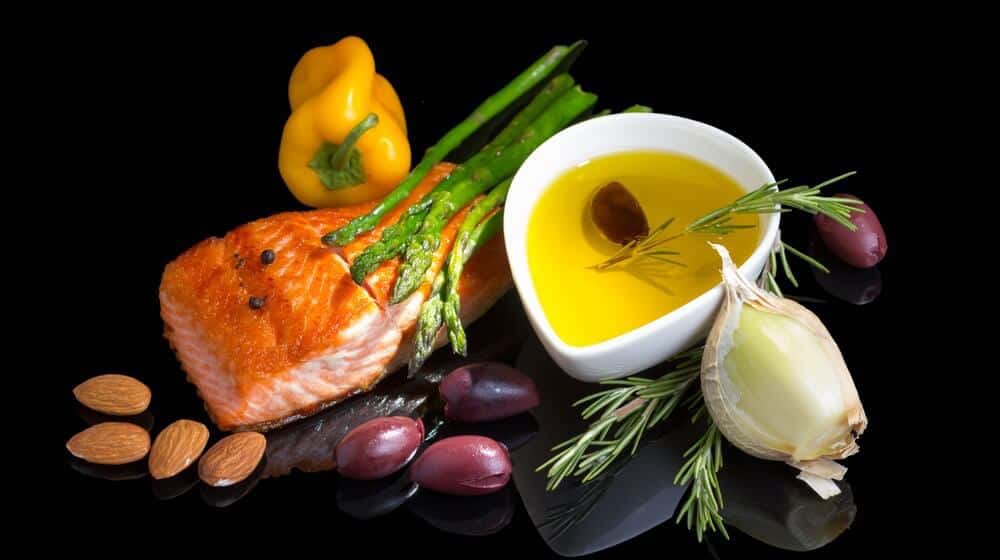
It is easier for your body to adapt to changes when they are done in small and slow doses. When you take this approach, it’s less likely for you to go back to your own ways. By taking one step at a time, you can work your way to an anti-inflammatory diet. Begin repairing your body by adding foods that fight inflammation. By simply finding these foods, you will be able to remove the causes for inflammation. Here at the 15 best anti-inflammatory foods to add to your diet.
1. Green Leafy Vegetables
When fighting inflammation, start by adding produce because fruits and vegetables are high in antioxidants that can restore cellular health and anti-inflammatory flavonoids. If you unfortunately struggle with the consumption of green vegetables, try out a juice that incorporates greens and other anti-inflammatory foods. For example, swiss chard is high in vitamin A, C, and K. This can protect your brain against any oxidative stress that is caused by free radical damage. By eating swiss chard, you can also protect yourself against vitamin K deficiency.
2. Bok Choy
Bok Choy is known as Chinese cabbage and is a great source of antioxidant vitamins and minerals. Studies show that there are over 70 antioxidant phenolic substances found in bok choy. For example, hydroxycinnamic acids are robust antioxidants that rummage free radicals. Bok choy is a versatile vegetable that can be used in dishes outside of Chinese cuisine.
3. Celery
Benefits of celery include both antioxidant and anti-inflammatory abilities that help improve blood pressure and cholesterol levels, as well as prevent heart disease. Celery seeds — which can be found either in whole seed form, extract form or ground-up — have impressive health benefits on their own, as they help to lower inflammation and to fight bacterial infections. It’s an excellent source of potassium, as well as antioxidants and vitamins.
How to Kill Ticks Naturally
Keep your family safe from Lyme disease...
A good example of mineral balance tied to inflammation is the proper mix of sodium foods and potassium-rich foods. Sodium brings in fluid and nutrients and potassium flushes out the toxins. Without this pairing, toxins can build up in your body, and once again inviting unwanted inflammation. Celery is that it’s an excellent source of potassium, as well as antioxidants and vitamins.
4. Beets
Foods that are full of antioxidants are generally dark in color and beets is a good example. The umbrella category of antioxidants fight to repair cell damage that is caused by inflammation. Betalain, an antioxidant found in beets, is the reason for the deep color and great anti-inflammatory.
When adding beets to your diet, you are also adding high levels of inflammation-fighting potassium and magnesium so if you are magnesium deficient, beets will likely raise your levels. Without magnesium, calcium is not processed within the body. Calcium will become unwanted and this buildup can cause kidney stones as well as inflammation. In a well-balanced diet, anti-inflammatory foods that are rich in calcium and magnesium, the body will process successfully.
5. Broccoli
It’s no surprise that broccoli is a valuable addition for healthy eating. Broccoli is high in potassium and magnesium. Its antioxidants are specifically potent anti-inflammatory substances. Broccoli is not only an antioxidant, but contains important vitamins, flavonoids, and carotenoids. All of these work together to lower oxidative stress and helps battle chronic inflammation and the chance of developing cancer.
6. Blueberries
Found in citrus, olive oil and dark-colored berries, quercetin is a flavonoid (a beneficial substance or phytonutrient that’s prevalent in fresh foods) that fights inflammation and even cancer. The existence of quercetin is one of the health benefits of blueberries, but you can find quercetin in some flavonoid supplements too. In a study looking for treatment for IBD, an extract from the noni fruit was used to affect the gut flora and colon damage done by inflammatory diseases.
Of the effects the extract had, quercetin built the prominent anti-inflammatory actions. Another study found that eating more blueberries slowed cognitive decline and improved memory and motor function. The scientists believed these results were due to the antioxidants in blueberries protecting the body from oxidative stress and reducing inflammation.
7. Pineapple
Quercetin is often paired with bromelain, a digestive enzyme that’s one of the benefits of pineapple. After being used for years as part of an anti-inflammatory foods protocol, bromelain is perceived to have immune-modulating abilities — it helps regulate the immune response that often creates unwanted inflammation. Pineapple helps improve heart health because of the effects of powerful bromelain, which can fight blood clotting and is said to be nature’s answer to those taking an aspirin a day to lower the risk of heart attack.
Bromelain has been proven to stop blood platelets from sticking together and/or building up along the walls of blood vessels – known causes of heart attacks or strokes. The benefits of pineapple are due to its high supply of vitamin C, vitamin B1, potassium and manganese. Pineapple is filled with phytonutrients that work as well as numerous medicines do to reduce symptoms of some of the most common illnesses and conditions.
Where to Buy Cedar Oil
To see the full line of tick repellent products, click the button below
8. Salmon
Salmon is an excellent source of essential fatty acids, and considered one of the best omega-3 foods. Omega-3s are some of the potent anti-inflammatory substances, showing steady relief of inflammation and reduction of the need for anti-inflammatory medicines. Research shows that omega-3 fatty acids decreases inflammation and may help lower the risk of chronic diseases, such as heart disease, cancer and arthritis. Omega-3 fatty acids are highly concentrated in the brain and appear to be essential for cognitive and behavioral functions. The source of fish and meat among anti-inflammatory foods is a vital element.
9. Bone Broth
Calcium, magnesium, phosphorus, silicon, and sulphur and minerals found in bone broth that our body can easily absorb. They contain chondroitin sulphates and glucosamine, the compounds sold as pricey supplements to reduce inflammation, arthritis and joint pain.If you suffer from leaky gut syndrome, doctors will recommend consuming a lot of bone broth because it contains collagen and the amino acids proline and glycine that can help heal leaky gut and the damaged cell walls of the inflamed gut.
10. Walnuts
Nuts and seeds can make up the difference for protein and omega-3s, when following a diet without a lot of meats. Add omega-3-rich walnuts to salads drizzled with olive oil for a healthy and satisfying anti-inflammatory meal, or even grab a handful for an on-the-go snack. Phytonutrients can help keep safe from metabolic syndrome, cardiovascular problems and type 2 diabetes. Some phytonutrients in walnuts are hard to find in any other foods, so it is always good to keep up with all of your phytonutrients.
11. Coconut Oil
Herbs and oils work together to make up anti-inflammatory partnerships. Lipids and spices create powerful anti-inflammatory compounds, especially coconut oil and turmeric. In a study in India, the high levels of antioxidants present in virgin coconut oil reduced inflammation and healed arthritis more successfully than leading medications.
Oxidative stress and free radicals are the two culprits of osteoporosis. Since coconut oil benefits include fighting free radicals with its high levels of antioxidants, it’s a leading natural treatment for osteoporosis. Coconut oil uses include topical preparations as well as culinary — and as a heat-stable oil, it’s great for sautéing anti-inflammatory vegetables.
12. Chia Seeds
Fatty acids found in nature are more balanced than the fats we consume in our typical diets. For example, chia seeds benefits offer both omega-3 and omega-6, which should be consumed to balance each other. Chia seeds are an antioxidant, anti-inflammatory, containing essential fatty acids alpha-linolenic and linoleic acid, mucin, strontium, vitamins A, B, E, and D, and minerals such as, sulphur, iron, iodine, magnesium, manganese, niacin, thiamine. Chia seeds’ ability to reverse inflammation, regulate cholesterol and lower blood pressure make it beneficial to consume for heart health. By reversing oxidative stress, someone is less likely to develop atherosclerosis when chia seeds are consumed regularly.
Where to Buy Cedar Oil
To see the full line of tick repellent products, click the button below
13. Flaxseeds
An excellent source of omega-3s and phytonutrients, flaxseeds benefits include being packed with antioxidants. Lignans, which are found in flaxseeds, are fiber-related polyphenols that provide you with antioxidant advantages for anti-aging, hormone balance and cellular health.
Polyphenols support the growth of probiotics and may also help get rid of yeast and candida in the body. Before you use flaxseed with your other anti-inflammatory foods, consider grinding them in a coffee grinder to ensure the digestive tract has easy access to their many benefits.
14. Turmeric
Turmeric’s primary compound, curcumin, is its active anti-inflammatory component. Noted for its effects against inflammation in multiple circumstances, health benefits prove invaluable in an anti-inflammatory diet. The journal Oncogene published results of a study that evaluated several anti-inflammatory compounds. The study found that aspirin and ibuprofen are least potent, while curcumin is among the most potent anti-inflammatory and anti-proliferative agents around.
Due to its high anti-inflammatory properties, turmeric is highly effective at helping people control rheumatoid arthritis . A recent study in Japan evaluated its relationship with interleukin, the inflammatory cytokine known to be involved in the RA process, and came across that curcumin significantly decreased these inflammatory markers.
15. Ginger
Ginger is an immune modulator that helps reduce inflammation that can be caused by overactive immune responses. Ginger can be used fresh, dried, or in supplement form and extracts. Ayurvedic medicine has commended ginger’s ability to improve the immune system.
It has been said that because ginger is effective at warming the body, it can help break down the accumulation of toxins in your organs. It’s also known to cleanse the lymphatic system, our body’s sewage system. Ginger health benefits may even include treating inflammation in allergic and asthmatic disorders.
